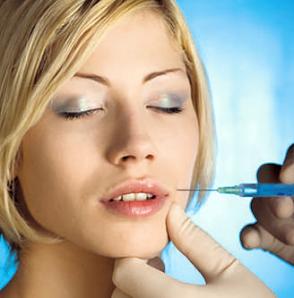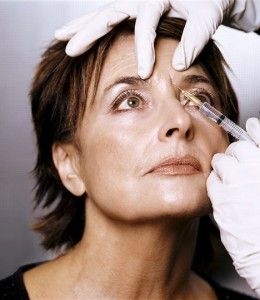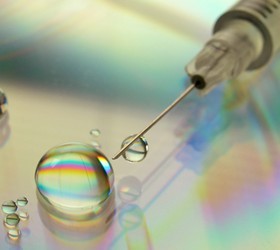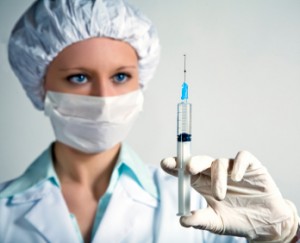"Botox Injections As An Anti Aging Treatment Might Be Beneficial For ONLY Anti Aging Doctors"


Botox injections (or simply referred to as Botox), is the popular name of an anti aging medicine called Botulinum Toxin type A.
Although Botulinum toxin types range from A through G, we will focus on type A as it is generally used for anti aging and cosmetic purposes. There are other medical purposes of Botox injections but the main reason usually is to act as a wrinkle filler to combat forehead wrinkles, crows feet, and other fine lines.
They're also used for medical reasons like asthma, muscle spasms in the neck, face or eyelids, migraines or migraine headaches, and excessive underarm sweating (hyperhidrosis, also called axillary hyperhidrosis), and a bunch of other medical conditions (which we'll cover briefly).
Botox injections, however, are most popular as an anti aging treatment to get rid of crows feet, forehead wrinkles, frown lines, and even smile lines in many cases.

Botox smoothes away and reduces or eliminates wrinkles; many times even deep wrinkles are reduced and eliminated by Botulinum Toxin Type A. It has also been used to get rid of or eliminate nasolabial folds.
A company called Allergan currently owns the rights to Botox (onabotulinumtoxinA). It was Dr Jean Carruthers who accidentally discovered that Botox injections successfully got rid of facial wrinkles. She made this discovery over 20 years ago.
Many people consider Botox to be one of the best discoveries of the 20th Century. But are Botox injections really all that great? Is it a wonder drug or a wonderful anti aging medicine? Or is it just one of the more popular anti aging drugs that's being anxiously administered by anti aging doctors for the sake of a pretty profit?
Before we can answer that, we must step back and take a close look at the benefits and ill effects of Botox injections in an unbiased manner.....
Is Botox A Good Anti Aging Treatment Option?
For the most part, the answer is yes! Botox injections are used to get rid of forehead wrinkles, crows feet, sometimes even replace face lift surgery, eliminate frown lines (temporarily), nasolabial folds, and other facial wrinkles.
Anti aging doctors are quick to recommend Botox for crows feet and facial wrinkles because it's a cosmetic procedure that guarantees them a profit. Therefore, it's safe to say that the well being or benefit of the patient is overlooked for the promise of a guaranteed payment, in many cases. Unfortunately, this world revolves around money and what's best for the patient has taken a back seat to profits.
Botox injections come with scary and horrible side effects (more on this below). However, the long term side effects of this toxin is not known. Please keep in mind that Botox is a toxin that paralyzes the nerves and also plumps out the skin (similar to what Juvederm does) in order to reduce/eliminate wrinkles and treat many other medical conditions. Actually, Botox injections don't plump out the wrinkles the way wrinkle fillers like juvederm, restylane, and perlane do; the ability of Botox to block nerve function and contractions as well as glandular nerve functions in order to "freeze" imperfections like crows feet, forehead wrinkles, aging hands, neck wrinkles, lip wrinkles (i.e.- Paris Hilton in 1999) , etc.
But the product paralyzes the facial muscles by blocking the nerves' impulses and functions and that, to me, is quite scary. Since we do not know the long term side effects of Botox, is it worth undergoing the anti aging treatment just to look a little younger?
That was a rhetorical question. Read on for more info about this denerving agent so that you can re-visit that question
a little later.....
Juvederm is another wrinkle treatment that's similar to Botox in many ways.....click here to learn more about the popular wrinkle filler called Juvederm and how it compares to Botox.
Celebrities Who Have Turned To Botox Injections And Other Anti Aging Treatments
If you're anything like my wife, then you'll know that tabloids will always print something controversial to create buzz and make a quick dollar. A great way to do that is to link celebrities to Botox injections or any other anti aging treatment or wrinkle filler.

As of this writing (July 2011), Megan Fox has been linked to Botox. She's done everything to deny it because she's probably of the belief that it will taint her image. Besides, she's only 25 years old. Why would someone so young, beautiful, and famous want to turn to Botox injections? It's just my opinion but I doubt that she's had any treatment done. I base this on the belief that she didn't need it and that I have not seen her appearance change in the last few years.
Then, we have celebrities like Courtney Cox who openly admits that she undergoes Botox injections and treatments every so often. We also have stories of other celebrities like Paris Hilton and Rachel Zoe who have supposedly undergone Botox treatments (supposedly Paris Hilton had it done on her lips in 1999).
Kim Kardashian had Botox injections in Sept 2010 for the world to see. She obviously did it proudly. Vanessa Williams had the toxin injected in her before her 40th birthday to maintain her already youthful appearance (or so she says). Other celebrities who have turned to Botox are American Idol's and The X Factor's very own, Simon Cowell. I think the man looks great for his age but he probably did it for the same reason as Vanessa Williams. And the beloved Patrick Dempsey and Donnie Osmond have also undergone the treatment. Feel free to look this info up in USA Today, Google, Yahoo, Bing, Facebook, Good Morning America, Psychology Today, current health news, or ABC News Online. Botox news is quite rampant!!
As a side note, Jessica Simpson actually turned to a popular wrinkle filler called Restylane to plump out her lips and get rid of any lip wrinkles. Of course, actress Lisa Rinna had plenty of injectible fillers pumped into her lips. She had lip reduction surgery in 2010 because she wanted to reverse the effects of the scar tissue forming around her lips. Technically, I believe she had silicone injected into her lips when she was 25 years old (yes, the same chemical used on breast implants, also called a boob job). Other popular wrinkle fillers and anti aging treatments being used are Restylane, Juvederm, Sculptra, and Matrixyl or Matrixyl 3000, and Perlane.
I, personally, don't care whether or not they've had any anti aging treatments done. It doesn't affect my life in any way so why should I worry. In the defense of celebrities, Botox injections aren't just an anti aging treatment for crows feet, forehead wrinkles, neck wrinkles, lip wrinkles, and other anti aging purposes. It's also helpful for conditions like ataxia, neaurological disorders, serious migraine headaches, even depression, and a bunch of other conditions. How do we know they didn't turn to Botox for any of those medical conditions, right?

What Medical Conditions Can Botox Injections Help Treat?
Despite the fact that Botox has sometimes replaced a wrinkle filler or wrinkle fillers like Juvederm, Restylane, and Perlane, the popular treatment has a lot more uses than the wrinkle fillers just mentioned. Anti aging doctors are discovering that Botox injections can treat a whole list of medical conditions such as the following:
As you can see, Botox injections can be used on a variety of conditions from frown lines, to forehead wrinkles, to crows feet, to muscle spasms, to even beauty pageants, to depression, to facial paralysis to many other conditions and symptoms.
The more I read up about Botox, I see that the injections are able to serve a large purpose in the medical field. But the
thing that concerns me the most are the side effects (temporary and long term). Is Botox worth undergoing after considering
all side effects?
Alternatives to Botox are also a good option if horrible side effects are a concern.....click here for more, natural Botox alternatives

What Are The Side Effects Of Botox Injections And Are They Worth The Risk?
So up until now, this product has been quite impressive, right? It can do a whole host of things. I have to admit that I was amazed by the number of conditions that it treated. And in some cases, I can understand why many patients would want to give Botox a try. Especially those who suffer from neurological disorders, facial paralysis, muscle spasms, excessive sweating, and other debilitating symptoms.
As impressive as Botox injections are, the side effects of the drug are scarier than any horror movie known to man!! Here is a list of the side effects of Botox that I took directly from Allergan's website:
Sorry about all the data that you had to read. My wife and I took it directly from the Allergan website. All of our writing is always original in that we create everything based on lots of research; we never copy anything from other sites. But for the purpose of disclosure, we figured we'd let our readers know that we took this information (word for word) from Allergan's site. Our credibility means the world to us and so do our readers.....:)
So back to these scary Botox side effects.....
Is it worth it? Do you have a condition like Ataxia that requires a quick solution to your pain? Or is your goal really just anti aging treatment related? If it's the latter, then are those side effects really worth it?
Please keep in mind that just like Juvederm, the long term side effects of Botox are not yet known. Therefore, the side effects in the long term can be worse than what's described above. Is it worth ruining your health or shortening your life just to POSSIBLY look a little better today? And at a cost of $300 to $1,000 every 3 to 6 months, I would rather spend a fraction of that money toward a natural alternative to Botox. Why? Because the purpose of this website and natural anti aging secrets is to look and feel great for a longer period of time and live as long as possible with as few complications as possible.
Unfortunately, Botox injections don't offer the opportunity to any of those options in a long term setting.....but if you're anti aging doctors reading this page, then it wouldn't surprise me if you disagreed. After all, pushing this product as a great anti aging treatment is a profit driven mantra, my friends. And the best way to drive these profits is for the anti aging doctors and anti aging companies to make this product affordable to everyone, not just the rich people of the world.
I find this to be the scariest part of Botox Injections. Another man made product that can have such horrible side effects is
being pushed by medical doctors as a great way to reverse aging (appearance wise, that is). There is little regard for the
well being of the human being and much emphasis on the almighty profit.
Alternatives to Botox injections can also come in the form of a diet.....click here for more, natural (and delicious) Botox alternatives
